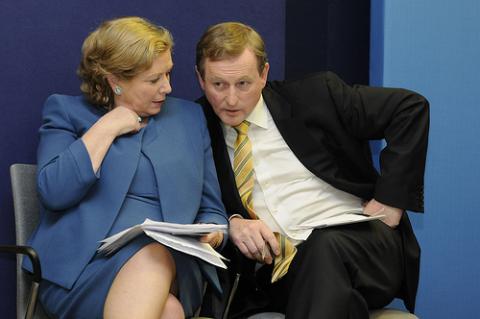Child protection agency is an unknown quantity

The new, and first, Minister for Children, Frances Fitzgerald, had fighting words about the new protection and welfare agency - it would end 'the procrastination, the deception and evasion that has allowed abusers go unpunished'. Sara Burke looks behind the rhetoric
What do we know about the plans to set up a new Child Protection and Welfare Agency? Is it a good move or not? The Programme for Government commits to "fundamentally reforming the delivery of child protection services by removing child welfare and protection from the HSE and creating a Child Welfare and Protection Agency (CWPA), reforming the model of service delivery and improving accountability in the Dáil."
So in effect that means removing child welfare services from the HSE and putting them into this new agency. There is little more detail in the Programme for Government.
The fact that Frances Fitzgerald (pictured above in consultation with the Taoiseach) is the first full Minister of Children is significant as it is the first time children's issues have had full rights at cabinet table; up to now, there was just a super junior minister with no voting rights.
The argument for the new agency is that children are being failed when these services are in the HSE. This is evident in the inability to count the number of children who had died in care, the continued failure of services to meet people's needs - such as in the Roscommon case or that of Daniel McAnaspie - and the high numbers of missing unaccompanied minors. Many, including Barnardos and Andrew Madden, have argued that these services need to be taken out of the HSE and have their own dedicated agency.
Ombudsman for Children Emily Logan told me she welcomed Frances Fitzgerald as senior minister with responsibility for children and the new agency. She said their work on the child protection guidelines clearly showed they had not got the attention they needed between 2003 and 2008, however she cautioned against underestimating the task of restructuring and said it should not be HSE child protection services by another name.
However, we have no idea how it will work, what its budget is, or who will be in charge. I put all these questions to the Office of the Minister for Children and got no answers. However if one looks at the Fine Gael pre-election publication on this, it gives us some detail. It proposed:
- The Minister for Children having executive function and responsibility for these services
- That this new CPWA would be delivered within 18 months
- Use of the model used in Minnesota, New South Wales and New Zealand
- Early intervention, inter-agency working, social workers with a minimum of two years experience working in front-line child protection.
But these are not in the Programme for Government, and when I asked I was told it was work in progress, just beginning, and they'll tell me when they know.
According to the HSE service plan, the child welfare and protection budget for 2011 is €587 million (out of €14 billion) and just under 3,000 whole-time equivalent posts (WTEs) – however this is solely those staff whose roles are fully focused on child protection; if you think about early intervention it is the public health nurses and family support workers who also work with these children and families.
The arguments against a CPWA were clearly articulated two weeks ago by Fergal Landy, a Galway researcher wrote an op ed in the Irish Times questioning the evidence for setting up a Child Protection and Welfare Agency. In that piece, Landy clearly raised points that some others I spoke to also made, namely that:
• Gordon Jeyes, HSE national director of child and family social services (a position filled for the first time in January), has had no opportunity to demonstrate that child protection can be prioritised when you have a sufficiently senior manager responsible who is reporting directly to the chief executive of the HSE.
• that taking services out of the HSE might make it more difficult to link with mental health services, public health nursing services, and other HSE services
• all the energy will go into setting up a new agency instead of improving the services already in place – and that this will cause problems for children, families and those who work with them.
I also spoke to another Galway based academic, Paul Michael Garret, who has researched and written extensively on these issues - specifically looking at what has been learned in the UK from high profile cases like Baby P or Victoria Climbie. He said one of the lessons from there is the need to join the dots between the economy and society; that we know that higher levels of unemployment, job losses and stresses lead to more difficult circumstances for families; that we need to address bigger social, political and economic issues, and that a dedicated child agency alone won't solve these problems.
